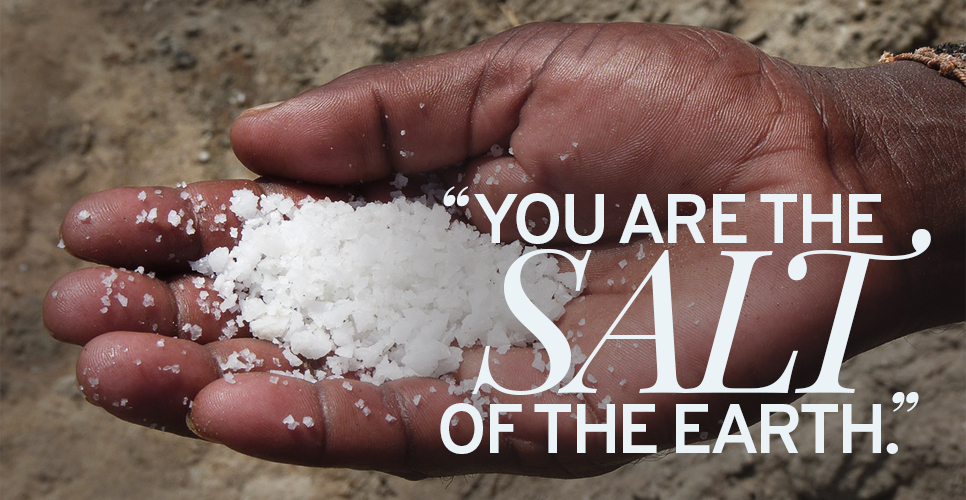 Theme: You are the salt of the earth.
Theme: You are the salt of the earth.
Scripture Readings: Is. 58:7-10; Ps. 111:4-9; 1 Cor. 2:1-5; Mt. 5:13-16
A story is told about a king who had three daughters. He wanted to test their love for him. He asked them, “how much do you love me”? The eldest daughter said, Father, I love you like jewelry! The king was found of gold, he liked the answer. The second daughter said, Father, I love you like the best wine! The king became happy because he loved wine. He would spend most of his time in drinking wines. The youngest daughter replied, Father, I love you like salt! The king became furious. He said, salt is useless, cheap and ordinary object. It means you do not love me. He shouted at her and asked her to depart from his presence. The youngest daughter met the palace chef and told him everything. The old chef had a special affection for the youngest daughter of King. They decided to make food without salt on the next festive day. The king tasted his favourite dishes and cried aloud, what is this? He said, It is no taste at all. He summoned the chef. The old chef answered, “Oh my Lord, I was afraid to include salt in the royal dishes because you declared in the court that salt was a useless and ordinary article. Therefore, I avoided it.” The king learned a lesson. He realized the importance of salt. He asked forgiveness from his youngest daughter. He embraced her as he realized his youngest daughter also loved him the most.
Jesus in the Gospel tells his disciples that we are the salt of the earth and the light of the world. (But I shall focus on the phrase, you are salt of the earth). This exaltation comes immediately after the beatitudes of Jesus during his sermon on the mount. It was addressed to all (Mt. 5:1-10). While addressing to his twelve disciples, Jesus explained them how to practice the beatitudes. Jesus knew that the beatitudes would make people the agent of transformation. Our lives would be useless if there is no goal. By giving metaphor of salt, Jesus made his disciples strive to have meaningful life. We shall try and understand the meaning of salt. It will help us to know Jesus’ call to be salt of the earth.
The salt is very important and indispensable for mankind in many different ways. They could be following: 1) Salt enhances the taste and flavour of food and makes it pleasant and edible. Without salt, many foods become insipid. Its deficiency in food is felt easily. 2) Salt preserves food and prevents decay. Right from the ancient times, salt is the commonest of all preservatives. 3) Salt dissolves in water and mixes fully with food. It apparently disappears by dissolution or disintegration. Lumps of salt in food may cause objectionable taste. 4) It remains as an invisible presence in the dishes. Other spices like chilly and turmeric give conspicuous colour which makes their presence visible. 5) Salt was also seen as the sign of purity because it is white and it is made from the purest elements of sun and sea.
It is interesting to note that the Jews also recognized the importance of salt in their religious life. Salt was sprinkled on the grain offerings and burnt offerings (Lev. 2:13; Ezek. 43:24). The children were rubbed with salt in the hope of ensuring a long life (Ezek. 16:4). The expression “a covenant of salt” stressed the durability of a covenant arrangement. (Num. 18:19; 2 Chr. 13:5)
In the time of Jesus, salt was connected in people’s minds with these special qualities. As a follower of Christ, they were asked to be salt which means to say that they were asked to be people with the qualities of salt. 1) They were asked to bring taste or flavour in the lives of others. Prophet Isaiah tells us how one could make other’s lives interesting; by reaching out to them in their basic needs. E.g. Mother Teresa brought flavours in the lives of people who lived in the gutter. 2) the followers of Christ were also asked to become preservatives in the lives of others. Preservatives does not allow to spoil or decay. Our presence in the lives of others must help them not to get spoiled by sins. E.g. St. Don Bosco dedicated his life for the betterment and education of street children and juvenile delinquents. 3) the followers of Christ were asked to become part of the community. They were to give their saltiness to the community in which they lived. They were to completely immersed into that community. E.g. St. Damien of Molokai chose to become the leper among the lepers. 4) the follower of Christ is asked to do the job silently without making it known to others. E.g. St. Maximilan Kolbe chose to die in the concentration camp silently without making it known to anyone. His sacrifice inspired many in the concentration camp. 5) the followers of Christ is asked to keep the purity of heart and body like the salt. E.g. St. Maria Gorethi, at very young age chose to die to keep her purity. She forgave her killer.
Each of the examples of being salt of the earth help us to understand the beautiful calling we have in Christian life. If we fulfill the calling, then our lives are worth living on earth. Look at the saints that I referred. St. Teresa of Kolkotta (Mother Teresa), St. Don Bosco, St. Damien of Molokai, St. Maximilan Kolbe and St. Maria Gorethi, each one of them fulfilled their mission. Thus they became the salt of the earth.
Usually salt does not lose its saltiness. There is only one possibility that it may lost its saltiness when it mixes with impurities. Jesus makes us aware that we should not lose our saltiness or else we will be thrown out and be trampled upon. Once the salt loses its saltiness, it cannot gain it back. It does not have capacity to gain its saltiness. Are there any impurities that have crept into our lives that we are failed to be salt of the earth? Let us learn from St. Paul’s (Second reading). He was good at oratory, knowledge of the law and was filled with zeal and enthusiasm. He relied on his human merits in Athens. He failed in his proclamation. Relying on the human capabilities in the proclamation was an impurity in St. Paul at Athens. He removed his impurity and began to proclaim crucified Christ in Corinth. The Jews, the pagans and everyone accepted his message. St. Paul became the salt of the earth for the people in Corinth.
The salt is so important commodity in our day to day life. Just like the salt, each one of us are important in the kingdom of God. All the saints realized it in their lives. It is our turn to make it work in our lives. Let us make every effort to become salt of the earth.
Fr. Alex D’Mello






